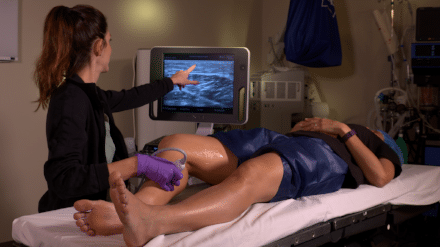Chronic Venous Insufficiency Symptoms, Causes, and Treatment
 What is Chronic Venous Insufficiency?
What is Chronic Venous Insufficiency?
Chronic Venous Insufficiency (CVI) often referred to as Venous Reflux Disease, Chronic Venous Disease (CVD), or Venous Stasis, is a condition of inadequate blood flow from the legs back to the heart. A combination of muscle activity and a series of one-way valves normally keep blood flowing upward from the lower extremities to the heart. With CVI, blood circulation is severely hampered, the valves become weak and ineffective allowing blood to pool in the lower legs.
CVI affects more than 30 million Americans which makes it ten times more prevalent than Peripheral Artery Disease (PAD). Unfortunately, less than two million Americans get treated annually, most likely because Vein Disease is not usually lethal. The likelihood of death from Venous Insufficiency is extremely low but a decrease in quality of life caused by this condition is extremely high. CVI occurs in 17% of men and 40% of women in the United States.
Patient Testimonial
"Just leaving the clinic and feel so confident with the results, can't wait until winter to do my additional treatment.
Thanks to Jilanne Rose for her time and friendly stuff.
Blessings"
Reyes Lopez
Advanced Vein Institute Patient
Symptoms of Venous Insufficiency
There are many symptoms from easily recognized venous disorders like varicose veins to general leg pain and leg fatigue. It is a substantial problem throughout the country. In fact, physical disability related to CVI affects productive work hours with an estimated loss of 2 million productive workdays per year. That is a lot of down time for workers and employers to deal with, especially considering how straightforward and successful in-office treatment can be.
The most common symptoms include:
- Varicose veins and spider veins
- Edema (Leg swelling)
- Pigmentation (change in skin color)
- Venous ulcers (leg sores)
- Aching legs
- Heavy legs
- Leg numbness
- Burning, throbbing or swelling legs
- Muscle cramps
- Leg fatigue
- Bulging veins
- Itching veins
- Restless legs
- Leg pain after sitting or standing long periods
- Bleeding veins

Patient Testimonial
"Dr. Rose and her staff are excellent. I would highly recommend them. They were both professional and friendly, and brought me back to good vein health."
Jim J. in Mesa, AZ
Advanced Vein Institute Patient
 What Causes Chronic Venous Insufficiency?
What Causes Chronic Venous Insufficiency?
CVI can be caused by several factors with the most common being family history. If parents have or have had CVI, there is a high likelihood that their children will suffer from it as well. Additional major causes of Venous Reflux Disease include age, hormones and pregnancy. Occupations which require prolonged standing and sitting are associated with a higher prevalence of CVI.
The following are found to be the most common causes:
- Family history
- Age
- Hormones
- Pregnancy
- Trauma to the legs
- Deep Vein Thrombosis (DVT)
Contributing risk factors include:
- Standing or Sitting for long periods
- Obesity
- Smoking
- Hypertension
- Lack of physical activity
Treatment of Chronic Venous Insufficiency
There is no cure for venous insufficiency although some relief from symptoms can be achieved with CVI treatment including compression stockings, increased exercise and elevation of the legs above the heart. Cooler weather can provide some relief as summer heat can cause veins to dilate and become weaker, a problem which is particularly prevalent in Arizona.
Your provider may also recommend Vasculera, an FDA approved Medical Food Product. Vasculera is indicated for the clinical dietary management of CVI and its complications. Vasculera is a prescription medical food product and, as such, is neither a drug nor a dietary supplement. This product is intended to manage the metabolic processes that underlie CVI and its complications.
As these conservative treatments cease to provide relief, there are a few minimally invasive in-office treatment options available to treat the affected veins for the longer term. Advanced Vein Institute of Arizona patients get back to their lives and can begin doing what they enjoy with the confidence that comes from receiving excellent care.
Click Here to learn more about additional superficial vein treatment options.
Next Steps for CVI Evaluation
A full exam and Duplex Ultrasound by a board certified Vein Specialist will enable the proper measurement of blood flow back to the heart as well as a proper diagnosis of overall vein health. At that time, following a physical examination and your medical history is reviewed, an individualized treatment plan can be recommended based on your specific needs.
Are you ready to get started?
Not quite sure yet?
Why not read what other patients have said, we love to share feedback!


![AdobeStock_124052634_Preview-104244-edited[1] AdobeStock_124052634_Preview-104244-edited[1]](https://advancedveinaz.com/wp-content/uploads/2018/10/AdobeStock_124052634_Preview-104244-edited1.jpeg)